-
 Japan says US tariffs 'extremely regrettable', may break WTO rules
Japan says US tariffs 'extremely regrettable', may break WTO rules
-
South Koreans anxious, angry as court to rule on impeached president

-
 Juve at in-form Roma with Champions League in the balance
Juve at in-form Roma with Champions League in the balance
-
Injuries put undermanned Bayern's title bid to the test

-
 Ovechkin scores 892nd goal -- three away from Gretzky's NHL record
Ovechkin scores 892nd goal -- three away from Gretzky's NHL record
-
Australian former rugby star Petaia signs for NFL's Chargers

-
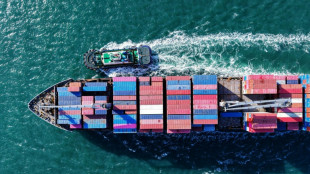 China says opposes new US tariffs, vows 'countermeasures'
China says opposes new US tariffs, vows 'countermeasures'
-
Athletics world watching as 'Grand Slam Track' prepares for launch

-
 Heat humble Celtics for sixth straight win, Cavs top Knicks
Heat humble Celtics for sixth straight win, Cavs top Knicks
-
Quake-hit Myanmar's junta chief to head to Bangkok summit
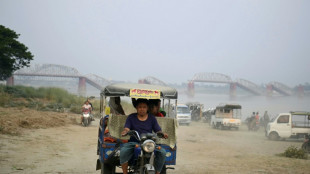
-
 New Spielberg, Nolan films teased at CinemaCon
New Spielberg, Nolan films teased at CinemaCon
-
Shaken NATO allies to meet Trump's top diplomat

-
 Israel's Netanyahu arrives in Hungary, defying ICC warrant
Israel's Netanyahu arrives in Hungary, defying ICC warrant
-
Shiny and deadly, unexploded munitions a threat to Gaza children

-
 Stocks tank, havens rally as Trump tariffs fan trade war
Stocks tank, havens rally as Trump tariffs fan trade war
-
Altomare hangs on to tie defending champ Korda at LPGA Match Play

-
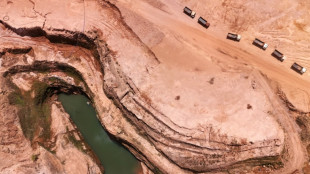 Paraguay gold rush leaves tea producers bitter
Paraguay gold rush leaves tea producers bitter
-
Health concerns swirl as Bolivian city drowns in rubbish

-
 Syria says deadly Israeli strikes a 'blatant violation'
Syria says deadly Israeli strikes a 'blatant violation'
-
Financial markets tumble after Trump tariff announcement

-
 Starbucks faces new hot spill lawsuits weeks after $50mn ruling
Starbucks faces new hot spill lawsuits weeks after $50mn ruling
-
Europe riled, but plans cool-headed response to Trump's tariffs

-
 'Shenmue' voted most influential video game ever in UK poll
'Shenmue' voted most influential video game ever in UK poll
-
New coal capacity hit 20-year low in 2024: report

-
 Revealed: Why monkeys are better at yodelling than humans
Revealed: Why monkeys are better at yodelling than humans
-
Key details on Trump's market-shaking tariffs
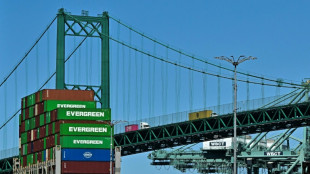
-
 'A little tough love': Top quotes from Trump tariff talk
'A little tough love': Top quotes from Trump tariff talk
-
US business groups voice dismay at Trump's new tariffs
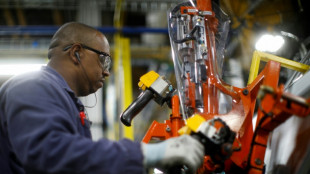
-
 Grealish dedicates Man City goal to late brother
Grealish dedicates Man City goal to late brother
-
US tariffs take aim everywhere, including uninhabited islands

-
 Trump sparks trade war with sweeping global tariffs
Trump sparks trade war with sweeping global tariffs
-
Israeli strikes hit Damascus, central Syria; monitor says 4 dead

-
 Slot 'hates' offside rule that gave Liverpool win over Everton
Slot 'hates' offside rule that gave Liverpool win over Everton
-
US stocks end up, but volatility ahead after latest Trump tariffs

-
 Barca oust Atletico to set up Clasico Copa del Rey final
Barca oust Atletico to set up Clasico Copa del Rey final
-
Mourinho grabs Galatasaray coach's face after losing Istanbul derby

-
 Grealish strikes early as Man City move up to fourth in Premier League
Grealish strikes early as Man City move up to fourth in Premier League
-
Reims edge out fourth-tier Cannes to set up PSG French Cup final

-
 Liverpool beat Everton as title looms, Man City win without Haaland
Liverpool beat Everton as title looms, Man City win without Haaland
-
Jota wins bad-tempered derby as Liverpool move 12 points clear

-
 Inter and Milan level in derby Italian Cup semi
Inter and Milan level in derby Italian Cup semi
-
Stuttgart beat Leipzig to reach German Cup final

-
 Trump unveils sweeping global tariffs
Trump unveils sweeping global tariffs
-
Italian director Nanni Moretti in hospital after heart attack: media

-
 LIV Golf stars playing at Doral with Masters on their minds
LIV Golf stars playing at Doral with Masters on their minds
-
Trump unveils sweeping 'Liberation Day' tariffs

-
 Most deadly 2024 hurricane names retired from use: UN agency
Most deadly 2024 hurricane names retired from use: UN agency
-
Boeing chief reports progress to Senate panel after 'serious missteps'

-
 Is Musk's political career descending to Earth?
Is Musk's political career descending to Earth?
-
On Mexico-US border, Trump's 'Liberation Day' brings fears for future

Deep ocean targeted for mining is rich in unknown life
A vast area at the bottom of the Pacific Ocean earmarked for controversial deep sea mineral mining is home to thousands of species unknown to science and more complex than previously understood, according to several new studies.
Miners are eyeing an abyssal plain stretching between Hawaii and Mexico, known as the Clarion-Clipperton Zone (CCZ), for the rock-like "nodules" scattered across the seafloor that contain minerals used in clean energy technologies like electric car batteries.
The lightless ocean deep was once considered a virtual underwater desert, but as mining interest has grown scientists have scoured the region exploring its biodiversity, with much of the data over the last decade coming from commercially-funded expeditions.
And the more they look the more they have found, from a giant sea cucumber dubbed the "gummy squirrel" and a shrimp with a set of elongated bristly legs, to the many different tiny worms, crustaceans and mollusks living in the mud.
That has intensified concerns about controversial proposals to mine the deep sea, with the International Seabed Authority on Friday agreeing a two-year roadmap for the adoption of deep sea mining regulations, despite conservationists' calls for a moratorium.
Abyssal plains over three kilometres underwater cover more than half of the planet, but we still know surprisingly little about them.
They are the "last frontier", said marine biologist Erik Simon-Lledo, who led research published Monday in the journal Nature Ecology and Evolution that mapped the distribution of animals in the CCZ and found a more complex set of communities than previously thought.
"Every time we do a new dive we see something new," said Simon-Lledo, of Britain's National Oceanography Centre.
Campaigners say this biodiversity is the true treasure of the deep sea and warn that mining would pose a major threat by churning up huge plumes of previously-undisturbed sediment.
The nodules themselves are also a unique habitat for specialised creatures.
"With the science as it is at the present day, there is no circumstance under which we would support mining of the seabed," said Sophie Benbow of the NGO Fauna and Flora.
- 'Mind-bogglingly vast' -
The Clarion-Clipperton zone has both its age and its size to thank for the unique animals discovered there, scientists say.
The region is "mind-bogglingly vast", said Adrian Glover, of Britain's Natural History Museum, a co-author both on the study with Simon-Lledo and on the first full stocktake of species in the region published in Current Biology in May.
That study found that more than 90 percent of species recorded in the CCZ -- some 5,000 species -- are new to science.
The region, which was considered to be essentially barren before an increase in exploration in the 1970s, is now thought to have a slightly higher diversity than the Indian Ocean, said Glover.
He said sediment sampling devices from the region might only capture 20 specimens each time -- compared to maybe 20,000 in a similar sample in the Antarctic -- but that in the CCZ you have to go much further to find the same creature twice.
Scientists are now also able to use autonomous underwater vehicles to survey the seabed.
These are what helped Simon-Lledo and his colleagues find that corals and brittlestars are common in shallower eastern CCZ regions, but virtually absent in deeper areas, where you see more sea cucumbers, glass sponges and soft-bodied anemones.
He said any future mining regulations would have to take into account that the spread of animals across the area is "more complex than we thought".
- 'Serious harm' -
The nodules likely started as a shard of hard surface -- a shark tooth or a fish ear bone -- that settled on the seabed and slowly grew by attracting minerals that naturally occur in the water at extremely low concentrations, Glover said.
Each one is likely millions of years in the making.
The area is also "food poor", meaning fewer dead organisms drift down to the depths to eventually become part of the seafloor mud. Glover said parts of the CCZ add just a centimetre of sediment per thousand years.
Unlike the North Sea, formed from the last ice age that ended 20,000 years ago, the CCZ is ancient.
"The abyssal plain of the Pacific Ocean has been like that for tens of millions of years -- a cold dark abyssal plain with low sedimentation rates and life there," Glover said.
Because of this, the environment impacted by any mining would be unlikely to recover in human timescales.
"You are basically writing that ecosystem off for probably centuries, maybe thousands of years, because the rate of recovery is so slow," said Michael Norton, Environment Programme Director, the European Academies' Science Advisory Council.
"It's difficult to argue that that is not serious harm."
O.Johnson--AMWN

